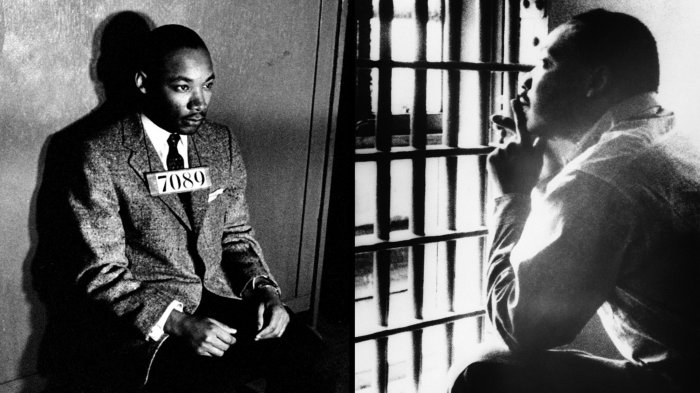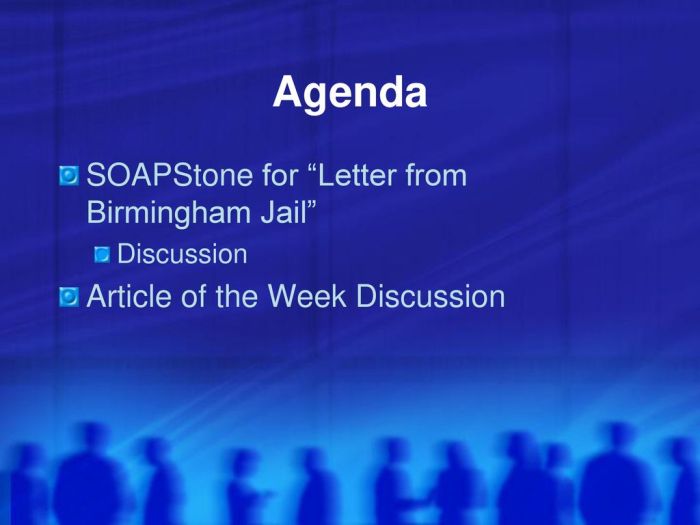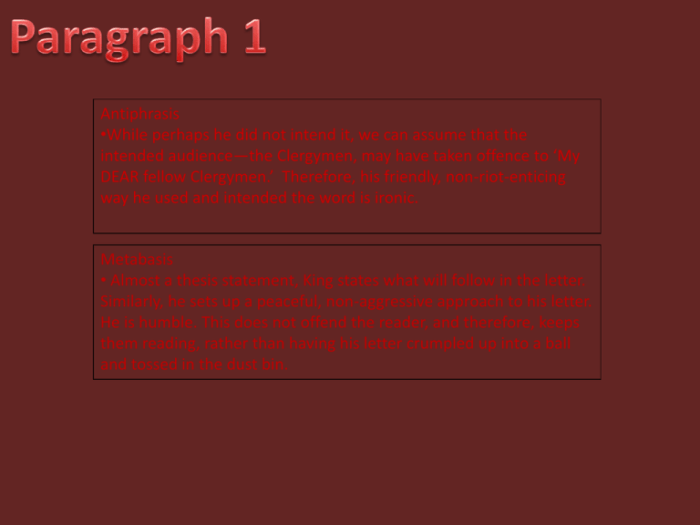Letter from birmingham jail soapstone – The “Letter from Birmingham Jail,” penned by the revered civil rights leader Martin Luther King Jr., stands as a testament to the power of nonviolent resistance and a clarion call for justice and equality. This seminal work, written in the confines of a Birmingham jail cell, has left an enduring legacy on the American civil rights movement and beyond.
King’s eloquent prose, his masterful use of rhetorical strategies, and his unwavering commitment to nonviolence have made this letter an enduring masterpiece of American literature.
Letter from Birmingham Jail: Historical Context

Martin Luther King Jr.’s “Letter from Birmingham Jail” is a seminal document in the American civil rights movement. Written in 1963 while King was imprisoned for protesting segregation, the letter eloquently articulates his philosophy of nonviolent resistance and the urgent need for racial equality.
The letter was addressed to eight white clergymen who had criticized King’s tactics, calling them “unwise and untimely.” King’s response defended his actions and Artikeld his belief in the moral imperative of civil disobedience.
Purpose and Intended Audience
King’s letter had two primary purposes: to respond to his critics and to rally support for the civil rights movement. He intended it to reach not only the clergymen but also a broader audience of white moderates who were sympathetic to the cause of racial justice but hesitant to support more confrontational tactics.
Rhetorical Strategies: Letter From Birmingham Jail Soapstone

King employed a variety of rhetorical strategies to make his case, including:
Appeals to Logic
- King used logic and reason to argue that segregation was immoral and unjust.
- He appealed to the principles of the Declaration of Independence and the Constitution to support his claim that all Americans deserved equal rights.
Appeals to Emotion
- King also appealed to his readers’ emotions by describing the personal experiences of African Americans living under segregation.
- He evoked images of police brutality, discrimination, and poverty to illustrate the urgent need for change.
Appeals to Ethics
- King appealed to his readers’ sense of ethics by arguing that they had a moral obligation to stand up against injustice.
- He challenged them to examine their own consciences and to question the morality of a system that denied basic rights to an entire group of people.
Key Arguments and Themes
King’s letter presents several key arguments:
Justice and Equality
- King argued that segregation was a violation of the fundamental principles of justice and equality.
- He maintained that all Americans, regardless of race, deserved to be treated with dignity and respect.
Nonviolent Resistance
- King advocated for nonviolent resistance as the most effective means of achieving social change.
- He believed that violence only served to perpetuate the cycle of hatred and injustice.
Impact and Legacy
The “Letter from Birmingham Jail” had a profound impact on the civil rights movement.
Immediate Impact
- The letter helped to galvanize support for the movement and inspired many to join the struggle for racial equality.
- It also helped to shift public opinion in favor of civil rights legislation.
Long-Term Impact, Letter from birmingham jail soapstone
- The letter continues to be a source of inspiration and guidance for activists and social justice movements around the world.
- It is considered one of the most important documents in American history and is widely taught in schools and universities.
Literary and Cultural Analysis
The “Letter from Birmingham Jail” is not only a historical document but also a literary masterpiece.
Structure and Language
- The letter is written in a clear and concise style, with a logical structure and persuasive arguments.
- King uses vivid imagery and powerful language to create a sense of urgency and to evoke the emotions of his readers.
Place in African American Literary Tradition
- The letter is a part of the long tradition of African American literature that has used writing to fight for social justice.
- It is a powerful example of the power of language to inspire change.
Soapstone Analysis

Subject
The subject of the letter is the moral imperative of nonviolent resistance to racial injustice.
Occasion
The letter was written in response to criticism of King’s tactics by eight white clergymen.
Audience
The intended audience was the clergymen, as well as a broader audience of white moderates.
Purpose
The purpose of the letter was to defend King’s tactics and to rally support for the civil rights movement.
Speaker
The speaker of the letter is Martin Luther King Jr., a prominent leader of the civil rights movement.
Tone
The tone of the letter is passionate and persuasive, yet also measured and respectful.
Ethos
King’s ethos as a respected leader of the civil rights movement lends credibility to his arguments.
FAQ Compilation
Who wrote the “Letter from Birmingham Jail”?
Martin Luther King Jr.
What is the main purpose of the letter?
To respond to criticisms of King’s nonviolent resistance tactics and to advocate for racial justice.
What are some of the key arguments presented in the letter?
King argues that nonviolent resistance is the most effective way to achieve social change, that racial segregation is morally wrong, and that white moderates are complicit in the perpetuation of racism.